see Dominion
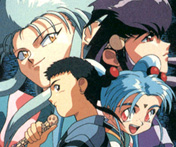
A story about a teenage boy, the pretty alien girl who loves him, the other pretty alien girl who loves him, the other other pretty alien girl who loves him, and a few other pretty alien girls (some of whom love him, too). And they all just happen to be some of the most powerful people in the universe. The plotline varies between sit-com and space opera, occasionally in the same episode. The plot of the first OAV series was heavily re-written to become the basis of Tenchi Muyo TV. The first two OAV series are available in North America from Geneon under the name Tenchi Collection - in fact, this was Geneon's flagship title - and an edited version of these has been aired on U.S. cable TV. The North American rights to the third OAV series are held by Funimation. The manga (with the translated title No Need for Tenchi) is available from Viz.
[Entry by Rob Kelk]
A side story to the Tenchi Muyo OAV series, this is Galaxy Police officer Mihoshi's recounting of her biggest case ever. The names in the story have been changed to protect the innocent, of course, but Mihoshi changes them to the names of her friends! Somehow, the relationships just don't change ... This comedy marks the first alternate Tenchi Muyo continuity, the first appearance of Kiyone, and one of the earliest appearances of Magical Girl Pretty Sammy. Available on VHS as part of the Tenchi Collection, or on DVD as part of the Magical Girl Pretty Sammy collection, from Geneon.
[Entry by Rob Kelk]
Tenchi Masaki is an ordinary schoolboy until gorgeous alien women (with their little sisters and meowing spaceships in tow) start to crash-land in his backyard. A little bit of Urusei Yatsura and a little bit of Ranma ½, with some Star Wars homages thrown in for good measure. The TV series is generally considered a parallel universe to the version of the story told in the OAV series. Highly recommended for fans of romantic comedies and sci-fi adventure.
Available from Geneon under the title Tenchi Universe.
[Entry by Dave Menard]
This latest installment of Tenchi fun is yet another parallel universe from the OAV and first TV series. In this story, Tenchi goes off to school in Tokyo leaving the girls behind in Okayama. This doesn't sit well with the passel of alien women, especially since Tenchi's getting awfully close to that new girl, Sakuya ...
Available from Geneon.
[Entry by Dave Menard]
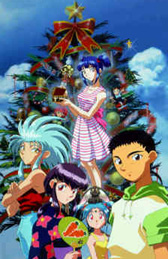
Tenchi Muyo in Love!: Tenchi and the girls must race back in time to keep an intergalactic criminal from altering the past. The first Tenchi movie, based off the TV series continuity. Spectacular animation combined with a good story make this film in many ways the best Tenchi feature.
Tenchi Muyo: Daughter of Darkness (a.k.a. Manatsu no Eve): Known as Midsummer's Eve in the UK and Europe. Tenchi's daughter appears, but who's the mother? And what does all this have to do with Yosho's childhood on planet Jurai? Not as well received by fans as the first Tenchi movie, DoD is nevertheless high-quality animation, though the story may seem to be a little rushed. This may be due to the long-circulated rumour that the plotline was originally written for a third OAV series.
Tenchi Muyo in Love 2 - Tenchi Forever: According to Pioneer/AIC, the final Tenchi Muyo TV feature. Forever does a fair job of resolving some of the longstanding conflicts between the two primary rivals for Tenchi's heart, and the bittersweet ending suggests that Tenchi has finally made a choice. A languid pace makes this feature tricky viewing, especially compared to the more frenetic pace of the earlier films. Worth watching only if you are willing to invest the attention needed to appreciate this final chapter.
[Entries by Dave Menard]
[Dave's comment about the first movie being the best is his opinion - some people, including the list maintainer, like the second movie better. All three movies are available from Geneon. - Rob Kelk]
see Tenchi Muyo TV
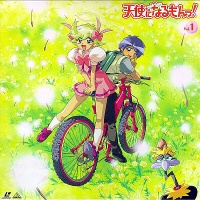
An odd romantic fantasy with an edge, concerning a teenaged boy named Yusuke whose life is turned upside down by the appearance of a very strange girl called Noelle and her even stranger family who come out of nowhere to change Yusuke's home into a fantasy toy house and Yusuke's life into chaos. Noelle seems to be out-of-this-world in many ways, not the least being her desire to "become an angel". But at the same time different otherworldly things are going on in the background which threaten Noelle, Yusuke and the others around them. The series takes a big "left turn" at the halfway point and becomes stranger and much darker. All-in-all Tenshi ni Narumon is a very different, compelling and ultimately satisfying fantasy.
Licenced in North America by Synch-Point.
[Entry by Dave Baranyi]
see Astro Boy
see Urusei Yatsura
An involving variation on The Terminator, with slight nods of the head towards Time Bandits. The animation is very good and the story, complex. Feudal Japan is depicted nicely and in detail, as is the far future. Great plot complications throughout.

The weather is something that happens, not something that's created, right? But Did you know that fairies can create the very weather itself?
In the picturesque town of Muhlenburg lives an 11 year old girl named Saga. An organized, efficient, "make a decision and go!" kind of girl, Saga is very embodiment of industrious, whose only character flaw is an impatient temper. She's not the type to be superstitious.
But Saga can see fairies. As a child, Saga looked to a sky while lying in a snow bank, and saw a beautiful fairy flying away on a trail of falling snow.
Still, childhood memories are easily dismissed as figments of the imagination, so it's no surprise when Saga dismisses the fairy she finds while running her errands, as a mere illusion. After all, fairies are lovely, beautiful creatures, not hyperactive, selfish, lazy, waffle-eating, 3-inch-tall toddlers.
But this one is! Her name is Sugar, and she's come to the human world to find her "twinkle" and become a great Snow Fairy, just like her mother.
With an appropriately whismical soundtrack and characters designed by the Queen of Cute, Koge Donbo, Tiny Snow Fairy Sugar is best described as an heartwarming animated fairytale.
Licenced by Geneon in North America.
[Entry by Abraham Evangelista]

A 13 episode slice of life drama about a group of 17-year-old high-school students. The nail-biting climax of episode one concerns whether or not Akari, a total sweetie with cherry-red hair, will get to sit next to the boy she likes, and the rest of the series pretty much follows on at the same tempo. Akari's squeeze is the sleepy-headed but kind-hearted Hiroyuki, whose ever-helpful nature causes him to acquire new female friends in each episode. The genius of this charming series is how its focus on the events of everyday life manages to elevate them to a level of importance that supplants any need for magical superheroes or quests to save the world. Having said that, many of the girls that Hiroyuki befriends have intriguing quirks: e.g. Serika practices black magic, Kotone is a psychic who only makes unlucky predictions, and Multi is an incompetent android sent to the school for field trials.
Rather remarkably for a TV series that is bordering on shoujo, To Heart actually started life as a Hentai dating sim. As well as the 13 episodes, there are 6 little "omake" (extras) which were originally broadcast with some of the episodes. They use super-deformed versions of the characters and are mostly even more low key than the main episodes.
Licenced by Right Stuf.
[Entry by Shez]
A runaway teenage girl, a transvestite and a homeless man find an abandoned child on Christmas Eve. When they decide to find the child's parents and return it, thus begins one of the stranger nativity stories you'll ever see.
Tokyo Godfathers is a touching and heart-warming story of fallen people being given a second chance - all because of this newborn. The girl, Miyuki, committed a horrific act during a family argument and can't bear the idea of facing her father again. Hana, the transvestite, had his happy life turned upside down by death and an act of anger. And Gin's own story of self-caused destruction weaves strands of truth into a fantasy he wants to believe in rather than face the truth. Their quest to reunite the child with her parents leads to a hilarious, almost improbable chain of events that leads to their redemption and finding home.
Age: 12+ Some scary moments and adult themes.
[Entry by Travers Naran]
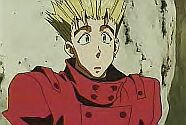
A sci-fi western comedy (mostly) focusing around the world's most unlikely criminal, Vash the Stampede. The man is apparently so dangerous that he's worth 60,000,000,000$$ ("double dollars"), but whenever anyone catches up to him in hopes of snagging the reward, they're always thwarted: sometimes by his skill with a gun, but mostly by his inherent goofiness. However, Vash does have a dark past, so mysterious that even he himself doesn't know what it is! All in all, a fairly lighthearted show with some serious themes, but a hilarious watch. (Geneon)
[Entry by KireiSarah]
A tasty twenty-episode satire on various anime, a loose plot with a school setting tying together the skits. May have been done later by a show or two (such as Abenobashi), but still fun. Trouble Chocolate has characters the later efforts in this theme can only envy, such as sister act Red Bean and Green Tea (Azuki and Matcha) and a (mostly) doting couple that make Marsha and John look like the Bickersons. The dubbed script is quite different from the original Japanese (and subtitles), making this series worth several watches: in the original with subtitles, dubbed, and dubbed with the subtitles as a lesson in translation gone too far.
1999 AIC show broadcast in Japan by TV Asahi. No known US broadcast, but licensed in US (five Region 1 DVDs) by Viz.
[Entry by H Newcomb]
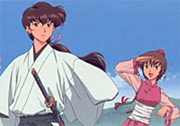
Ran, a female samurai, is a self-described "beautiful female drifter" wandering through feudal Japan, carried only by the ever-changing wind and her eternal thirst for sake. Generally accompanying her is Miao (Meow), a wandering martial artist from China characterised mostly by happy-go-luckiness, a good heart, and an utter, frightening lack of anything resembling forethought or intelligence. Together the two, rather more frequently than Ran would like, get embroiled in resolving problems of local corruption or crime. An episodic light-hearted parody of Japanese "wandering samurai and his sidekick" shows, high points being likable characters and spectacular fight scenes. 13 episodes, available now from Bandai.
[Entry by Blade]
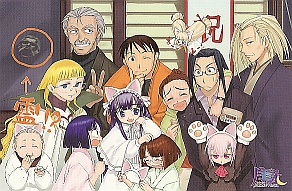
Kohei is a young man from a family of powerful spiritualists who happens to not have any of the powers of his relatives, other than an ability to take photographs of supernatural occurrences and a tendency to not be affected by many aspects of magic. Kohei's life begins to change when while on an assignment to photograph an old haunted castle in Germany he meets a pretty young girl named Hazuki who happens to be a vampire who has been trapped in the castle. Kohei helps Hazuki to break free, and becomes involved in Hazuki's search for her mother who disappeared years before. But powerful forces in the shadowy world of vampires want Hazuki back, and Kohei finds himself in the role of protecting Hazuki while trying to come to an understanding of their odd mutual attraction. With a brilliant and witty script that is matched by aggressively edgy animation, masterful swings between French bedroom farce-style humor and gothic horror, a compelling sound track and very likable characters, Tsukuyomi is a totally enjoyable fantasy.
Licenced in R1 by Funimation.
[Entry by Dave Baranyi]
see Juuni Kokki